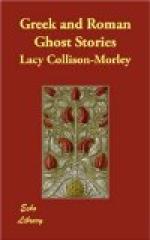The belief in apparitions existed, however, at all times, even among educated people. The younger Pliny, for instance, writes to ask his friend Sura for his opinion as to whether ghosts have a real existence, with a form of their own, and are of divine origin, or whether they are merely empty air, owing their definite shape to our superstitious fears.
We must not forget that Suetonius, whose superstition has become proverbial, was a friend of Pliny, and wrote to him on one occasion, begging him to procure the postponement of a case in which he was engaged, as he had been frightened by a dream. Though Pliny certainly did not possess his friend’s amazing credulity, he takes the request with becoming seriousness, and promises to do his best; but he adds that the real question is whether Suetonius’s dreams are usually true or not. He then relates how he himself once had a vision of his mother-in-law, of all people, appearing to him and begging him to abandon a case he had undertaken. In spite of this awful warning he persevered, however, and it was well that he did so, for the case proved the beginning of his successful career at the Bar.[26] His uncle, the elder Pliny, seems to have placed more faith in his dreams, and wrote his account of the German wars entirely because he dreamt that Drusus appeared to him and implored him to preserve his name from oblivion.[27]
The Plinies were undoubtedly two of the ablest and most enlightened men of their time; and the belief in the value of dreams is certainly not extinct among us yet. If we possess Artemidorus’s book on the subject for the ancient world, we have also the “Smorfia” of to-day, so dear to the heart of the lotto-playing Neapolitan, which assigns a special number to every conceivable subject that can possibly occur in a dream—not excluding “u murtu che parl’” (the dead man that speaks)—for the guidance of the believing gambler in selecting the numbers he is to play for the week.
Plutarch placed great faith in ghosts and visions. In his Life of Dion[28] he notes the singular fact that both Dion and Brutus were warned of their approaching deaths by a frightful spectre. “It has been maintained,” he adds, “that no man in his senses ever saw a ghost: that these are the delusive visions of women and children, or of men whose intellects are impaired by some physical infirmity, and who believe that their diseased imaginations are of divine origin. But if Dion and Brutus, men of strong and philosophic minds, whose understandings were not affected by any constitutional infirmity—if such men could place so much faith in the appearance of spectres as to give an account of them to their friends, I see no reason why we should depart from the opinion of the ancients that men had their evil genii, who disturbed them with fears and distressed their virtues ...”




